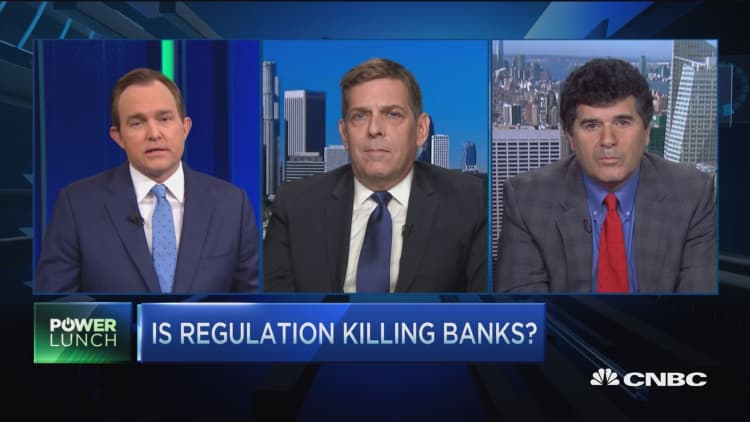Banks and corporations helped push financial technology start-up funding to an all-time high, according to a joint report by KPMG and CB Insights.
The global funding tally of $13.8 billion represents a doubling of money put to work by investors in 2015, according to the report.
Corporate investors participated in 1 in 4 U.S. fintech deals, according to the report. In 2015, the value of fintech deals and the number of investments hit all-time highs as investors clamored to buy into budding start-ups. The report suggested that even more fintech funding may come from corporates.
"While corporate investors will likely continue to invest in fintech in order to drive their own internal innovation and ability to compete with non-traditional market entrants, some institutional investors may shift away from fintech investing in the short term due to lower perceived rates of return," the report said.
The increased investing activity came as sector initial public offerings performed poorly. Lending Club, which debuted on public markets in late 2014, struggled last year and On Deck Capital, which lends to small businesses, also saw disappointing stock performance after its IPO in late 2014. After both companies saw shares trade up immediately after their public offering, prices have fallen more than 60 percent each. When payments start-up Square priced its IPO late in 2015, the company sold shares below its expected range.

"Some of the more traditional organizations see how quickly alternative models, like Square or Stripe in the payments space or Xoom in the money transfer space, have evolved and they have a choice, to either adjust and adapt or lose market share," said Conor Moore, national co-lead partner of KPMG's venture capital practice in the U.S.
Banks of all sizes were joined by investors including KKR, Alphabet and even package shipper UPS to participate in deals for various fintech start-ups, ranging from cash transfer companies to insurance products to stock portfolio management.
Read MoreWall Street catching up to fintech revolution
Citigroup's fintech portfolio is the largest of all banks, with 13 start-ups backed from 2011 through 2015. Goldman Sachs, with 10 start-ups backed; and JPMorgan Chase, with five, represent other Wall Street leaders in fintech boardrooms.

In Asia, corporate investors represented more than 40 percent of investors in the startups for most of 2015, according to the report. One of KPMG's fintech experts said growing corporate interest in start-ups bodes well for the sector.
"As the level of interest from banks and insurers grows, this will mean there are far more exit strategies," said Warren Mead, global co-leader of fintech with KPMG International.
Read MoreHow robots will kill the gig economy
But not every fintech company is eager to take banks on their board and in their capital structures.
"We don't have a big bank as an investor, so it's hard to say whether they'd be a good investor or not," said David Klein, CEO and co-founder of CommonBond, an online student lending platform. "I do think it's telling that one big bank's venture and innovation arm wanted to invest in our company but had to pull out for 'regulatory reasons' — a sign, I think, of how difficult it is for banks to innovate, even if they wanted to."






